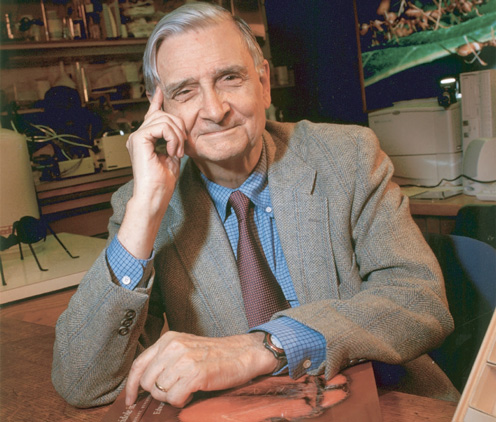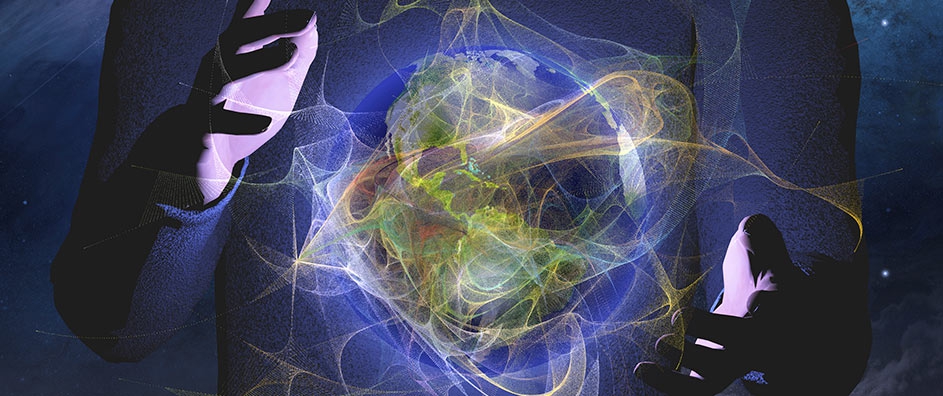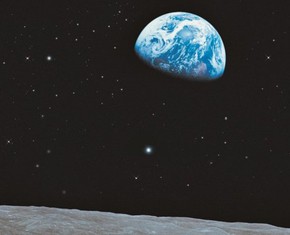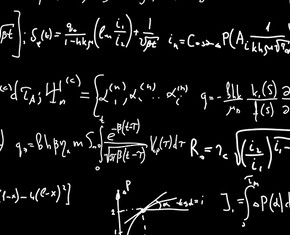The views expressed in our content reflect individual perspectives and do not represent the authoritative views of the Baha'i Faith.
Arts, crafts and sciences uplift the world of being, and are conducive to its exaltation. Knowledge is as wings to man’s life, and a ladder for his ascent. Its acquisition is incumbent upon everyone. – Baha’u’llah, Epistle to the Son of the Wolf, p. 26.
The harmony of religious belief with reason is a new vista which Baha’u’llah has opened for the soul of man. – Abdu’l-Baha, The Promulgation of Universal Peace, p. 455.
If religion were in harmony with science and they walked together, much of the hatred and bitterness now bringing misery to the human race would be at an end. – Abdu’l-Baha, Paris Talks, p. 144.

Edward O. Wilson
In 1998 the renowned biologist, environmentalist and humanist philosopher Edward O. Wilson published a groundbreaking book called Consilience: The Unity of Knowledge. Wilson’s thinking in that book has, since then, had an enormous impact on science.
Consilience, as Wilson defines it, is the principle that evidence from unrelated, independent sources can converge powerfully in the truth. Even when each individual piece of evidence may not be completely convincing, if several of those pieces independently support a common conclusion, that conclusion is usually right.
You might know this theory by other names—the unity of science, the unity of knowledge, universology or strong scientific consensus. No matter what you call it, though, consilience simply means that proving the veracity of any scientific theory requires a convergence of evidence from different lines of inquiry to verify and support real knowledge.
We know the truth, in other words, when we see the unity in it.
The concept of consilience isn’t new. It comes originally from the ancient Greek idea that an intrinsic, logical, unified orderliness governs the known universe. In his book Wilson wrote that consilience grows out of “a conviction, far deeper than a mere working proposition, that the world is orderly and can be explained by a small number of natural laws.” The entire philosophy of science has revolved around this idea since the Ancients, despite the fact that scientific knowledge has become increasingly specialized and fragmented over the past few centuries.
So if you’re wondering about how to answer the recent spate of “denialists” in our world—climate science deniers, holocaust deniers, evolution deniers, moon landing deniers—just think about consilience and how it can be applied to determine the actual truth of any situation. When you find solid conclusions on any subject from several different independent methods and researchers, you have strong consilience—and a high degree of certainty about the truth of your overall conclusion.
One piece of evidence, or even a few, especially if they come from the same source, have nowhere near the same level of consilience. Denialists use random bits of “evidence” to make their case, and then try to force all other evidence to conform to their conclusions. Consilience does the opposite.
This same reasoned principle can apply to many other areas of life beyond the disciplines of science—history, philosophy, even religion:
Consider what it is that singles man out from among created beings, and makes of him a creature apart. Is it not his reasoning power, his intelligence? Shall he not make use of these in his study of religion? I say unto you: weigh carefully in the balance of reason and science everything that is presented to you as religion. If it passes this test, then accept it, for it is truth! If, however, it does not so conform, then reject it, for it is ignorance! – Abdu’l-Baha, Paris Talks, p. 144.
The Baha’i teachings urge consilience on all of us—they ask that we independently investigate the truth of our own spiritual reality; that we gather evidence from all areas of life; and that we come to an independent conclusion that each of those pieces of evidence validate and support:
Day and night you must strive that you may attain to the significances of the heavenly kingdom, perceive the signs of divinity, acquire certainty of knowledge and realize that this world has a creator, a vivifier, a provider, an architect — knowing this through proofs and evidences and not through susceptibilities — nay, rather, through decisive arguments and real vision; that is to say, visualizing it as clearly as the outer eye beholds the sun. – Abdu’l-Baha, Foundations of World Unity, p. 65.
God has not intended man to blindly imitate his fathers and ancestors. He has endowed him with mind or the faculty of reasoning by the exercise of which he is to investigate and discover the truth; and that which he finds real and true, he must accept. He must not be an imitator or blind follower of any soul. He must not rely implicitly upon the opinion of any man without investigation; nay, each soul must seek intelligently and independently, arriving at a real conclusion and bound only by that reality. – Abdu’l-Baha, Foundations of World Unity, pp. 73-74.
The Baha’i Faith upholds the agreement of science and religion as one of its most central principles, and the Baha’i writings exalt and honor those who have immortalized themselves through art and science. Speaking to the students and faculty of Stanford University in 1912, Abdu’l-Baha praised and glorified the role of the sciences and the arts, saying that “the sovereignty of science is greater than the dominion of rulers:”
The highest praise is due to men who devote their energies to science, and the noblest center is a center wherein the sciences and arts are taught and studied. Science ever tends to the illumination of the world of humanity. It is the cause of eternal honor to man, and its sovereignty is far greater than the sovereignty of kings. The dominion of kings has an ending; the king himself may be dethroned; but the sovereignty of science is everlasting and without end. Consider the philosophers of former times. Their rule and dominion is still manifest in the world. The Greek and Roman kingdoms with all their grandeur passed away; the ancient sovereignties of the Orient are but memories, whereas the power and influence of Plato and Aristotle still continue. Even now in schools and universities of the world their names are revered and commemorated, but where do we hear the names of bygone kings extolled? They are forgotten and rest in the valley of oblivion. It is evident that the sovereignty of science is greater than the dominion of rulers. Kings have invaded countries and achieved conquest through the shedding of blood, but the scientist through his beneficent achievements invades the regions of ignorance, conquering the realm of minds and hearts. Therefore, his conquests are everlasting. May you attain extraordinary progress in this center of education. May you become radiant lights flooding the dark regions and recesses of ignorance with illumination. – Abdu’l-Baha, The Promulgation of Universal Peace, pp. 348-349.
















Comments
Sign in or create an account
Continue with Googleor